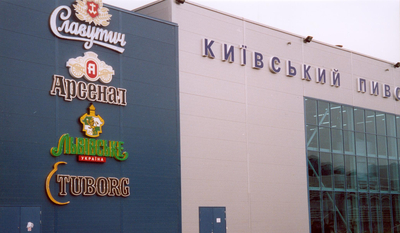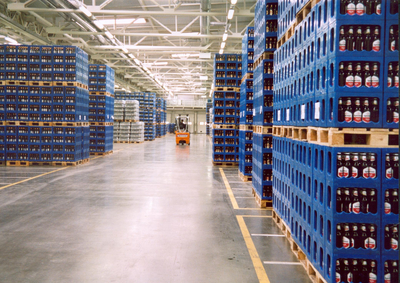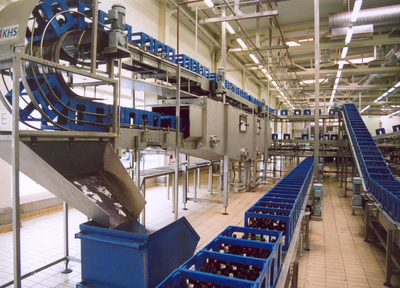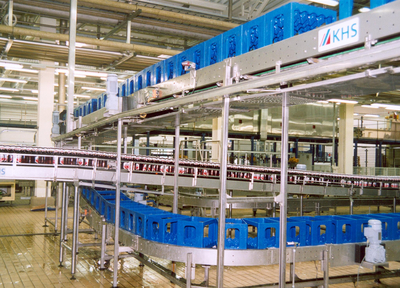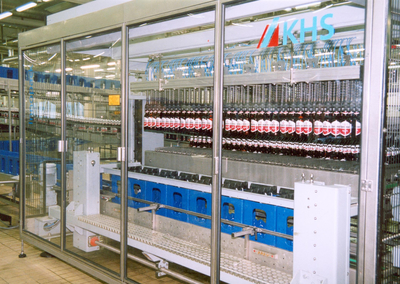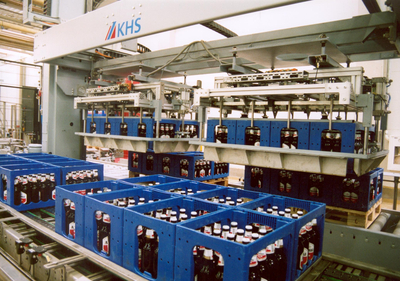
Carlsberg's Slavutich Brewery Group Sees Plenty of Future Potential in Ukraine
Extensive investments in KHS technology for planned sales growth
Jaroslaw Niebisch*
Ludmila Enke**
The brewing industry is in a state of permanent flux worldwide, as illustrated among other things by the Slavutich Brewery Group in Ukraine (formerly Baltic Beverage Holding (BBH) and now part of the Carlsberg Group).
BBH was founded by the Finnish company Hartwall and Pripps from Sweden and operates in the Baltic and the Commonwealth of Independent States or CIS. The Carlsberg Group and Scottish & Newcastle (S&N) controlled BBH for a long time as a joint venture. When Heineken and Carlsberg jointly acquired S&N at the start of 2008, the two brewery giants divided up their holdings. Former S&N activities within the UK – plus various other things – went to Heineken, while the Carlsberg Group took over the remaining 50% of BBH shares. The BBH Group therefore finds itself firmly in the hands of Carlsberg and along with it a major proportion of the Eastern European beer market. This, among other things, consolidates Carlsberg's position as the fifth largest brewery group worldwide and as number two in Europe. The Ukraine represents both a growth market for beer and a significant market for the Carlsberg Group. Beer sales rose by 20% in 2007, while beer sales from Carlsberg activities rose by even 37%. This trend continued in 2008, when the Slavutich Brewery Group, a Carlsberg Group company, saw a 25% increase in sales (results from the report for 3Q08). In order to perfectly meet the demand for continued future growth, Carlsberg in Ukraine invested in KHS technology again in 2008, acquiring extensive innovative KHS filling and packaging equipment to augment its primarily KHS fleet of machines. The outcome of Carlsberg’s collaboration with KHS in Ukraine for 2008 involved two KHS glass bottling lines, a KHS canning line, an upgrade of an existing KHS keg line, the expansion of an existing KHS line to include a new glass depalletizer and the replacement of a KHS single-end bottle washer. Sergey Chuprina, chief engineer at Slavutich, says, "Thanks to the sharp increase in demand for our quality beers, it was necessary for the projects to be completed not only reliably but also very quickly. KHS once again excelled with its speed, precision, and now par-for-the-course installation of outstanding technical systems in our production plants."
* Sales Manager for Ukraine, KHS AG, Bad Kreuznach, tel: +49 (671) 852-2608
** KHS General Director in Ukraine, KHS AG, Kiev, tel: +380 (44) 461-9362
Three breweries with a capacity for 10.5 million hl of beer, kwas, and non-alcoholic beverages
The Slavutich Brewery Group now has three breweries in Ukraine; all of them part of the Carlsberg Group: the Slavutich brewery in Zaporizhia, the Slavutich brewery in Kiev, and the Lvivska brewery in Lviv. The BBH Group entered the Ukrainian market with the acquisition of the Slavutich brewery, founded in 1974 in Zaporizhia in the south of Ukraine. In 1999, BBH traveled further west and acquired the traditional Lvivska Brewery in Lviv that was set up in 1715. Since 2004, BBH has operated a newly constructed brewery in the capital city of Kiev in the heart of Ukraine. The Slavutich Brewery in Kiev has gone down in Ukrainian brewing history as the first and to date only greenfield project of the past fifteen years. Chuprina says, "Unlike the Carlsberg Group, all other international brewery corporations depend exclusively on the takeover of existing breweries."
After its most recent investment in innovative KHS technology, the Carlsberg Group breweries now have filling and packing capacities for around 10.5 million hectoliters of beer, non-alcoholic beverages, and kwas. Capacities are distributed as follows: Slavutich in Zaporizhia produces approximately 5 million hectoliters, Slavutich in Kiev around 3.5 million hectoliters, and Lvivska in Lviv about 2 million hectoliters. Primarily the Kiev and Zaporizhia sites are due for expansion in the future.
Number three among Ukrainian brewery groups
After Sun InBev and Obolon, the Slavutich Brewery Group is number three among the brewery groups of Ukraine. Slavutich is forecast to hold 24% of the Ukrainian beer market share in 2008. This represents significant growth compared to its market share in 2007 of 20.4%. It therefore comes as no surprise that a declared objective of the Slavutich Brewery Group is to become number two on the market in the near future.
Extensive range of beer brands
One definite reason for the Ukrainian brewery's success is its balanced, high-quality range of beers that are aimed at diverse target markets. The Carlsberg, Baltika, Tuborg, Holsten, and Fosters beer brands, bottled under license, are positioned in the super premium segment. Slavutich and Slavutich Ice are positioned as upper mainstream brands. Lvivske, the traditional beer brand that is particularly popular in Western Ukraine, falls into the mainstream category. The Arsenal brand has also been developed for the mainstream market and the discount beer Khmilne is the lowest priced product.
True to its name, it is no wonder that the Slavutich beer brand is enjoying such great success. This brand is currently responsible for around 40% of Slavutich beer sales in Ukraine. After a successful relaunch of Slavutich's branded products in 2007, sales rose by a heady 125%. Cherry and lime flavor beers were only recently introduced to the market under the name Slavutich Ice, but have already proved a resounding success. Results from the 3Q08 report showed a 37.5% sales growth for the Slavutich brand. At present the Slavutich brand holds a market share of 7.3% on the Ukrainian beer market (excluding Slavutich Ice), thus occupying a firm fourth place.
Increasing exports
Ukrainian beers from the Slavutich Brewery Group are also popular outside Ukraine. Around 10% of total beer sales are exported. Significant export markets include Russia, Belarus and Moldavia, plus the U.S.A., Canada, and Israel. The Slavutich Brewery Group has even developed its own beer brand especially for export to the Moldavian market. This is designed to capitalize on the predicted increase in beer sales on a market that borders directly on the domestic market.
Main focus remains on the domestic market
The main focus of the Slavutich Brewery Group is still predominantly the Ukrainian market. According to forecasts, it still has plenty of potential for future growth. The per capita consumption of beer in Ukraine is currently 61 liters a year. Market research institutes anticipate an increasing trend.
Also a steadily increasing demand for non-alcoholic beverages and kwas
The Slavutich product range within Ukraine also includes non-alcoholic beverages. The Pepsi brand, for example, is filled here under license. The Taras brand of kwas is another new non-alcoholic beverage that is enjoying a slice of the action. Taras is brewed according to a traditional recipe and is BBH's answer to the constantly increasing demand for kwas in Ukraine.
Breakdown in percent by container type
Glass bottles are still the consumers' preferred containers for beers, non-alcoholic beverages, and kwas, with PET bottles in second place. Of the containers used at Slavutich 48% are glass bottles. PET bottles follow at 38%, with cans and kegs sharing the remaining 14% in approximately equal measure.
Canned beers and non-alcoholic beverages on the increase
Sales of beer and non-alcoholic beverages filled in cans have significantly increased recently. The reason for this is that beverages filled in cans were relatively expensive because the cans had to be imported. Now that cans are manufactured within Ukraine, things have changed. At the same time, cans have become more popular among consumers.
New KHS canning line for a bigger slice of the action
The Slavutich Brewery Group has been predictably quick to act to secure the largest possible slice of the action with regard to cans. Investment in a new KHS canning line at the Kiev site gives it capacity for 50,000 cans an hour. The new KHS canning line replaces an existing line that could fill 20,000 cans per hour. KHS had to install the new 50,000 can-per-hour line in exactly the same space occupied by the previous 20,000-cph system. And on top of all that, Slavutich allowed just six weeks for installation and commissioning, wanting to guarantee a constant supply. Chuprina claims that "KHS achieved the well-nigh impossible, adhering to the timeframe in every detail and managing to perfectly integrate the line into the confined space between two systems."
Gentle depalletizing
The first station in the new KHS line is an Innopal AS1H depalletizing robot that fully automatically feeds the waiting palletized cans to the line. Pallets loaded with new containers are conveyed to the pushoff level on a pallet lift down a shaft that is enclosed on three sides. Below the pushoff level, the block is centered on all sides by an additional centering bar. A pushoff frame that is closed on all four sides gently pushes the containers onto the container table. Because of the extremely limited amount of space, the steel frame lift is integrated into the pushoff frame. Intermediate layers are removed by a pivoting intermediate layer remover.
Fast conversion with the Innofill DMD
Faulty cans are sorted out by a vacuum bridge while "good" cans travel straight to the rinser and finally to the mechanically controlled Innofill DMD can filler. The Innofill DMD is equipped with 76 filling stations and is currently intended to fill 0.5-liter and 0.33-liter cans. The Innofill DMD purposely keeps changeover times short. The height of the filler turret can be adjusted together with the ring bowl and filling valves to the desired level within minutes. The height adjustment can likewise be used to easily change the filling level during ongoing production operations. There is no need to replace return gas tubes when changing can types. The result is time and cost savings. A further advantage is the maximum flexibility provided by the automatic height adjustment facility – also for the future. If a decision is made to fill other can sizes at a later date, the system will quickly self-adjust.
Innopas P II SC for precision pasteurization of each product
The pasteurizer in operation is a modular, double-deck Innopas P II SC. It is equipped with an integrated PU control system and is designed particularly for gentle product handling. It guarantees individually specified PU values for each type of beer bottled on the new line. The energy and water consumption in continuous pasteurizer operation is reduced to a minimum by the heat exchange between the heating and recooling zones. Active spraying on each deck is a standard feature of the Innopas P II SC for a uniform pasteurization process.
Various packaging options
Checked cans are transported to the packaging station by a mass conveyor. The Innopack Kisters SP 080 shrink packer currently handles three-lane processing of four-packs or two-lane processing of six-packs. The packs are shrink-wrapped in either clear or printed film. The shrink pack system is flexible and gives Slavutich additional options at a later date if required. It would be possible, for example, to shrink wrap additional can sizes or shapes or to choose new pack formations. Such adjustments can be made simply by reconfiguring the system parameters.
The Innopack Kisters Primus TSP tray shrink packer already in use at Slavutich has been integrated into the new line. Shrink packs produced by the Innopack Kisters SP 080 travel directly to this system. The Primus series Innopack Kisters tray shrink packer is able to repack freshly produced shrink packs either into trays or tray shrink packs as required. It is even possible to pack individual cans into tray packs in which case the cans bypass the shrink packer. The Primus series Innopack Kisters tray shrink packer is the only system that is able to pack individual cans into trays and/or tray shrink packs.
To make the most of the limited space available, the packs are lifted by a spiral conveyor to a height of four meters where they are fed to the Innopal PB1H for palletizing. The pallet conveyor supplied by KHS supplies pallets to the new line and the existing system. This means that 165 pallets can be checked and conveyed per hour.
New flexible KHS glass bottling line design also earns high satisfaction scores
Chuprina is equally as satisfied with the new KHS canning line at the Kiev site as with the two new KHS glass bottling lines in Zaporizhia, each designed to process about 50,000 bottles per hour. Both systems had to be integrated into one shop. They also had to be able to communicate with one another. Each of the lines is equipped to handle both refillable and non-refillable bottles. Glass bottles can be switched as required from the dry area on one line to the dry area on the other line. This has the advantage of maximizing flexibility and increasing system availability. When switching from non-refillable to refillable bottles, for instance, the remaining non-refillable bottles on one line can be palletized while the other line is being reconfigured.
System feed and discharge has been kept deliberately simple
Anther special feature of the lines is their U-shaped layout. This means that the lines are supplied with empty containers in the same shop area where the filled containers are removed. This simplifies line feed and discharge considerably. In response to the brewery’s request for a visible line feed and discharge concept, KHS developed a master plan stipulating how existing lines could be redesigned within the brewery to result in the U-shaped format. Thought is being given to incorporating automated line feed and discharge into all lines. Chuprina says, "Our philosophy is to exploit the potential to optimize. We therefore greatly value the logistical advice given to us by KHS."
The two newly installed KHS glass bottling lines at the Slavutich brewery site in Zaporizhia are equipped with identical technical components. While one of the lines integrates existing KHS filling and labeling systems, the second line is comprised of all new components.
Innopack SP times two
Non-refillable bottles are handled by the Innopal AS1H palletizer with a pallet lift. Refillable bottles are processed by an Innopal RS3 1EKN1 depalletizer, with an Innopack SP decrater downstream. The Innopack SP is a twin-axis machine that gives exceptional accessibility and ease of operation. It is extremely flexible and is ideally designed for both crating and decrating. It was thus no coincidence that not one but two Innopack SPs were ordered for each glass bottling line.
Cutting-edge single-end bottle washing system
The Innoclean EM single-end bottle washer is equipped with state-of-the-art Triple-i-Drive technology and energy-saving bottle carrier. Here the bottles undergo intensive pre-washing before the main washing operation. Two rotating tubes spray the bottles internally at high pressure, enabling discharge of coarse soiling residue with outstanding efficiency. This increases the service life of the caustic solution. This user-friendly machine also incorporates automatic removal of broken glass.
Tried-and-tested Innofill DMG filler
The filling system of choice is the mechanical Innofill DMG pressure filler. Chuprina explains, "We already traditionally depend on this reliable filling system. We currently have five Innofill DMG fillers in operation within Carlsberg's Slavutich Brewery Group and we are extremely satisfied with the bottling results." The Innofill DMG operates without filling tubes but with return gas tubes. It is pressurized with CO2 until the pressure between the bowl and the bottle is equal. As soon as the pressures have been equalized, the fluid valve opens. The liquid displaces the pressurization gas and forces it back into the ring bowl. The filling phase is completed when the beverage rising in the bottle closes the return gas tube. Pressure is relieved by the snifting valve. The prime benefit of this filling method is the gentle and low oxygen bottling process – plus simple operation and maintenance as well as exact and reproducible fill levels. The filled glass bottles are then fed to either the crowner or the ring pull capper.
Modular design labeling machine guarantees maximum flexibility
The need for maximum flexibility lies behind the choice of the Innoket SE 2080 labeling machine. The basic setup of this labeler generation has been kept relatively simple. It is comprised of a table structure and a central labeling carousel. The labeling carousel can then be fitted with a wide range of labeling stations. The Innoket SE 2080 installed at the Slavutich Brewery in Zaporizhia is currently equipped with three docking stations. One is for the adhesive-pressure labeling station, one is for the cold glue labeling station, and the third is for the camera-based alignment module. This configuration can be changed at any time. They could be replaced, for instance, with hot melt or roll-fed labelers. If additional labeling processes are required, the only necessary investment would be in appropriate labeling stations. Stations are simply docked to the Innoket SE 2080 and undocked, making labeling station changeover quick and easy. If a labeling station is changed, the software and computers always automatically synchronize all stations.
Whether refillable or non-refillable bottles, the line is able to handle both with the Innopack SP that packs glass bottles into crates, or even with the Innopack Kisters TSP 050 B that packs them into tray or pad shrink packs. Once packed, the glass bottles are palletized either by the Innopal PB1H2 palletizer (non-refillable bottles) or the Innopal RS3 1 BGN1 palletizer (refillable bottles). Packed loads of non-refillables are secured in shrink film.
Perfect technical systems in place for future success
Chuprina says, "The performance delivered by KHS in 2008 was outstanding in every respect. From the upgrade of the existing keg line in Zaporizhia to integration of the new glass depalletizer and replacement of the existing bottle washing equipment in Lviv, everything went like clockwork. "
With innovative KHS systems the Slavutich Brewery Group in Ukraine is equally prepared for further sales growth as well as for a new era under the exclusive aegis of Carlsberg. Chuprina says, "We are proud to be a member of such an internationally significant brewing corporation as the Carlsberg Group. Carlsberg demands the highest quality standards for its products and, precisely because of this, has undergone significant expansion in recent years. Here in Ukraine we also live the Carlsberg philosophy. We see this as a fundamental basis for future success on the marketplace."

